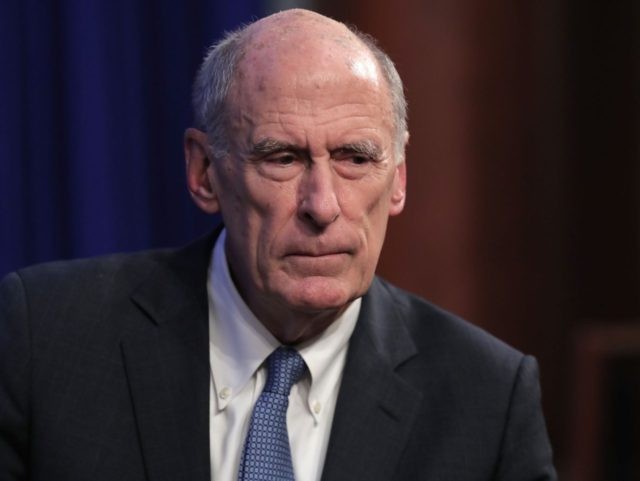Director of National Intelligence Dan Coats warned the Senate Intelligence Committee on Tuesday about the risk posed by the national debt.
“This situation is unsustainable, as I think we all know, and represents a dire threat to our economic and national security,” he said. He echoed an Obama-era warning by then-Chair of the Joint Chiefs of Staff Admiral Michael Mullen, who called the debt “most significant threat to our national security” in 2010.
White House Office of Management and Budget Director Nick Mulvaney admitted Monday, under questioning from Breitbart News’ Michelle Moons, that President Donald Trump’s new budget proposal does not balance the budget within ten years.
The best Mulvaney could offer is the prediction that the budget deficit would decline as a percentage of Gross Domestic Product (GDP) several years from now as a result of faster economic growth.
Trump’s budget projects a deficit of $1 trillion next year, as the federal debt continues to climb toward $21 trillion. On the campaign trail, Trump blasted then-President Barack Obama for doubling the national debt from $10 trillion to $20 trillion. But he has no plan to rein it in.
His tax cut may raise new revenues in the long run to cover some of the gap, but probably not enough. And this week, he called for $200 billion in new federal infrastructure spending.
Mulvaney blamed Congress for failing to cut spending — and he has a point. Democrats have resisted Republican efforts to cut spending or reforming entitlements (the ultimate driver of long-term deficits).
In 2011, Democrats pushed Republicans into accepting the principle of a rough parity between changes to defense spending and changes to social spending, though defense is a smaller part of the budget (and, arguably, a more important priority.) That led to a massive budget agreement last week, where Trump was able to secure higher spending for the military only at the cost of higher spending on everything else. (He needed Democratic votes to avoid a shutdown.)
Sen. Rand Paul (R-KY) staged a last-minute stand against the agreement, causing a shutdown that lasted for several hours overnight. But it was merely gestural politics, not backed up by any serious legislative or political effort.
The budget deal led MSNBC’s Joe Scarborough to declare the death of the Tea Party on Friday, with New York Times columnist Bret Stephens applauding. But the political marginalization of the deficit hawks — which began, ironically, when newly-elected Tea Party Republicans reluctantly accepted the 2011 agreement rather than be blamed national default — leaves no one in Washington to lead the effort to put America’s fiscal house in order.
Joel B. Pollak is Senior Editor-at-Large at Breitbart News. He was named to Forward’s 50 “most influential” Jews in 2017. He is the co-author of How Trump Won: The Inside Story of a Revolution, is available from Regnery. Follow him on Twitter at @joelpollak.

COMMENTS
Please let us know if you're having issues with commenting.